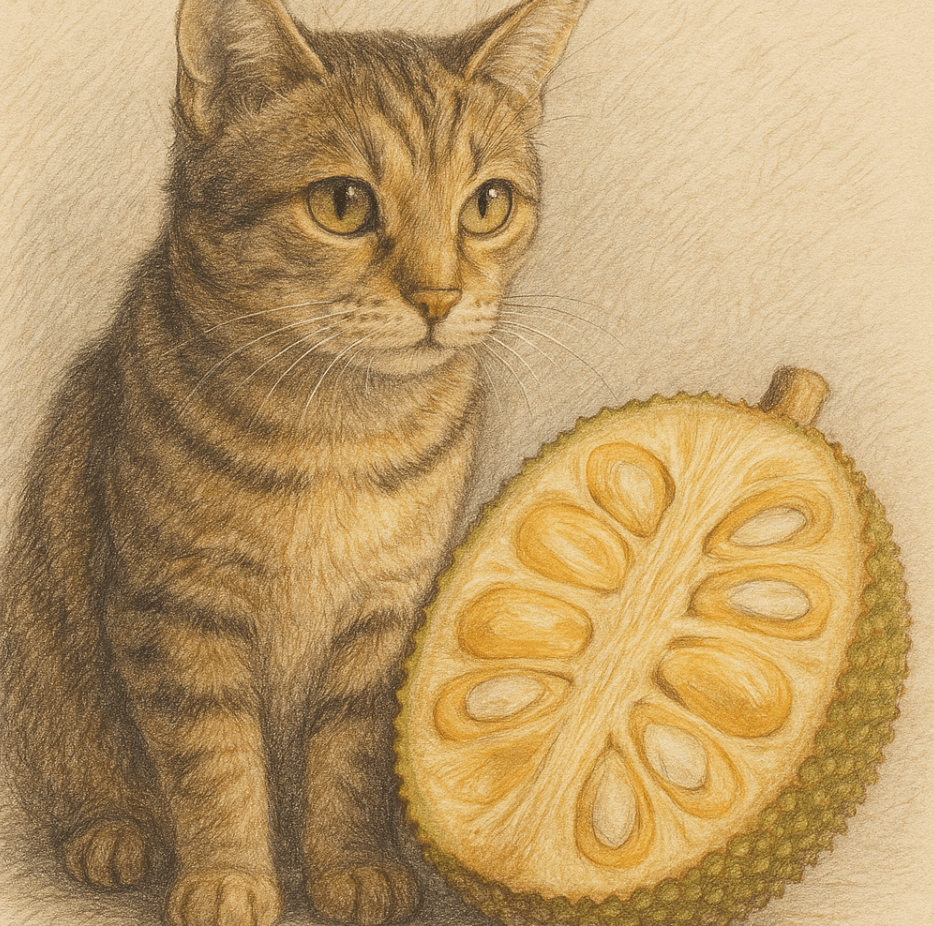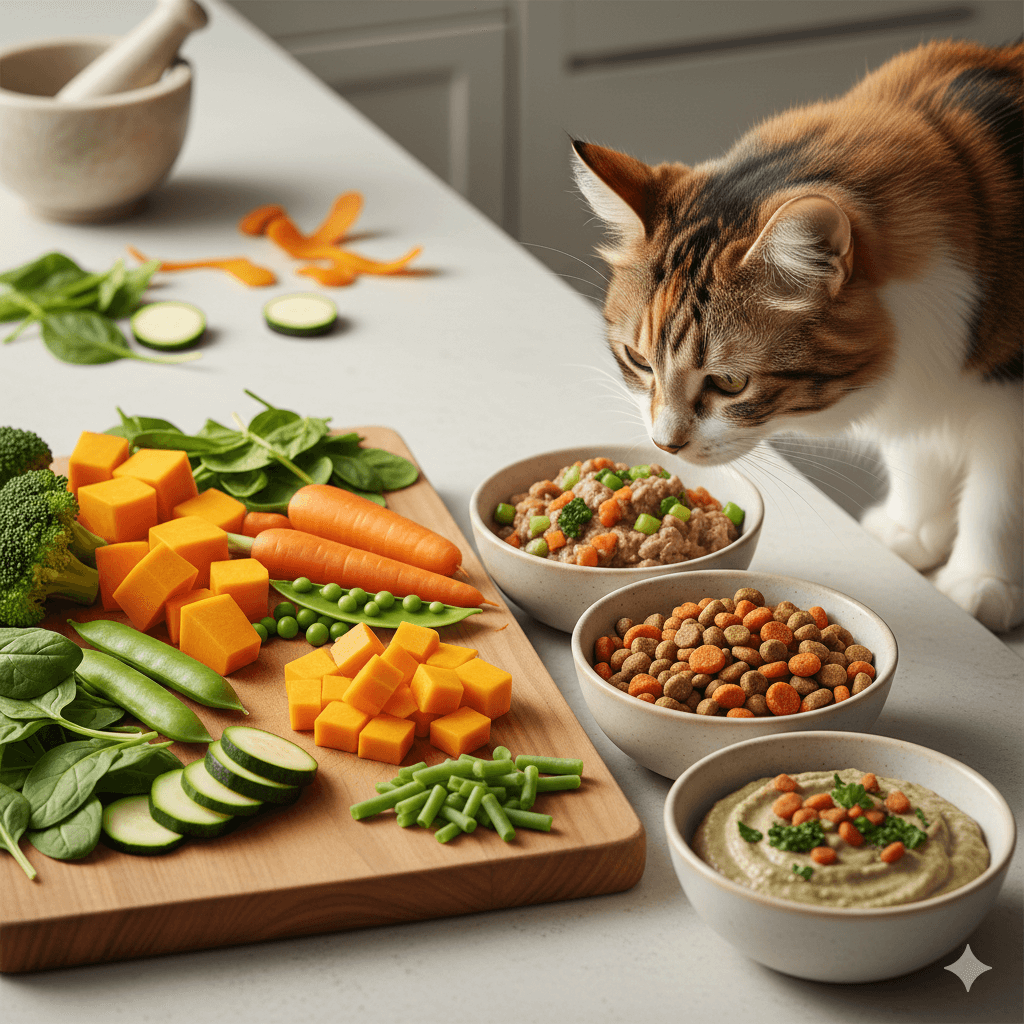Can Cats Eat Jackfruit?
As pet owners, we’re often curious about what human foods are safe to share with our feline friends. Jackfruit, a tropical fruit known for its unique texture and sweet flavor, has gained popularity in recent years. But can cats eat jackfruit? While it may seem harmless, understanding the potential risks and benefits is crucial before offering this fruit to your cat. In this blog post, we’ll explore whether jackfruit is safe for cats, how it might affect their health, and what alternatives you can consider to keep your furry companion happy and healthy.
Potential Risks of Feeding Jackfruit to Cats
While jackfruit is generally safe for humans, it poses several risks for cats that every pet owner should be aware of. These hazards can range from mild discomfort to more serious health concerns.
High Sugar Content:
Jackfruit contains natural sugars, which can upset a cat’s digestive system and lead to diarrhea or vomiting if consumed in large amounts.Risk of Choking:
The fibrous texture of jackfruit can pose a choking hazard, especially for smaller cats or those prone to gulping food.Allergic Reactions:
Some cats may develop allergic reactions, such as itching, swelling, or gastrointestinal upset, after consuming jackfruit.Nutritional Imbalance:
Cats are obligate carnivores, meaning their diet should primarily consist of animal protein. Feeding them plant-based foods like jackfruit can disrupt their nutritional balance.Difficulty Digesting Fiber:
Jackfruit is high in fiber, which cats’ digestive systems are not designed to process efficiently, potentially leading to bloating or constipation.
These risks highlight why caution is essential when considering feeding jackfruit to your cat. Always prioritize their safety over curiosity or convenience.
Benefits of Jackfruit (If Any) for Cats
Although jackfruit isn’t typically recommended for cats, there are a few minor benefits worth noting if fed in moderation. However, these advantages are limited compared to a cat’s primary dietary needs.
Hydration Boost:
Jackfruit contains a high water content, which can help keep your cat hydrated, especially during hot weather.Low Toxicity:
Unlike some fruits, jackfruit is not toxic to cats, making it safer than other human foods if accidentally ingested in small amounts.Source of Vitamins:
Jackfruit contains vitamins like vitamin C and A, which may offer minor antioxidant benefits if consumed occasionally.Mild Flavor Appeal:
Some cats may enjoy the mild sweetness of jackfruit as an occasional treat, satisfying their curiosity about new tastes.Encourages Exploration:
Offering small, safe portions of jackfruit can provide mental stimulation for cats who enjoy exploring new textures and flavors.
While these benefits exist, they must be weighed against the potential risks to determine if jackfruit is truly suitable for your cat.
Check this guide 👉Can Cats Eat Vegetable Oil? Best 7 Expert Tips!
Check this guide 👉Can Cats Eat Acai? Best 7 Expert Tips!
Check this guide 👉Can Cats Eat Durian? Best 7 Expert Tips!

Safe Alternatives to Jackfruit for Cats | Risks of Feeding Unsafe Human Foods |
|---|---|
Plain cooked chicken (unseasoned) | Onions and garlic causing toxicity |
Small pieces of banana | Grapes and raisins leading to kidney failure |
Pumpkin puree (plain, unsweetened) | Chocolate triggering heart issues |
Blueberries (in moderation) | Dairy products causing lactose intolerance |
Watermelon (seedless, in small amounts) | Spicy or salty foods upsetting digestion |
How to Safely Introduce Jackfruit to Your Cat
If you decide to let your cat try jackfruit, it’s essential to take precautions to minimize risks. Follow these guidelines to ensure a safe experience.
Offer Tiny Portions:
Start with a very small piece, no larger than a pea, to see how your cat reacts before offering more.Remove Seeds and Tough Fibers:
Jackfruit seeds and fibrous parts can be choking hazards; always remove them before serving.Monitor for Reactions:
Watch your cat closely for signs of digestive upset, allergic reactions, or discomfort after eating jackfruit.Avoid Seasonings or Additives:
Never feed your cat jackfruit that has been seasoned, sweetened, or mixed with other ingredients.Consult Your Veterinarian:
Before introducing jackfruit, seek advice from your vet to ensure it aligns with your cat’s specific dietary needs.
By following these steps, you can mitigate risks while allowing your cat to explore new flavors safely.
Signs Your Cat May Be Struggling with Jackfruit Consumption
Even with precautions, complications can arise if your cat consumes jackfruit improperly. Watch for these warning signs to act quickly if something goes wrong.
Vomiting or Diarrhea:
These symptoms may indicate that your cat’s digestive system is struggling to process jackfruit.Excessive Drooling:
Drooling could signal irritation or nausea caused by the fruit’s texture or taste.Lethargy or Weakness:
A sudden lack of energy might suggest an adverse reaction or nutritional imbalance.Swelling or Itching:
Signs of an allergic reaction include facial swelling, redness, or excessive scratching.Loss of Appetite:
If your cat refuses to eat after trying jackfruit, it could indicate discomfort or illness.
Recognizing these signs early allows you to seek veterinary care promptly, preventing further complications.
Common Mistakes to Avoid When Feeding Jackfruit
Feeding jackfruit to your cat requires careful consideration to avoid mistakes that could endanger their health. Here are some pitfalls to watch out for.
Offering Large Portions:
Even small amounts of jackfruit can upset a cat’s stomach; large portions increase the risk significantly.Including Seeds or Fibers:
Seeds and tough fibers can cause choking or blockages, so always remove them before serving.Adding Sweeteners or Seasonings:
Cats cannot process added sugars or spices, which can lead to serious health issues.Ignoring Allergic Reactions:
Failing to monitor your cat after feeding jackfruit can delay treatment for potential allergies.Replacing Balanced Meals:
Jackfruit should never replace a cat’s primary diet, as it lacks the essential nutrients they need.
Avoiding these mistakes ensures a safer and healthier experience for your cat.
Alternatives That Mimic the Benefits of Jackfruit
If you’re hesitant about feeding jackfruit, there are plenty of alternatives that mimic its benefits without the associated risks.
Plain Cooked Chicken:
Provides high-quality protein and satisfies a cat’s carnivorous dietary needs.Pumpkin Puree:
Offers hydration and fiber to aid digestion without overwhelming their system.Blueberries (in Moderation):
Rich in antioxidants and safe for cats in small quantities.Watermelon (Seedless):
Hydrates cats and offers a refreshing treat during warm weather.Cat-Specific Treats:
Designed to meet feline nutritional requirements while providing variety and flavor.
These alternatives allow you to cater to your cat’s instincts while keeping them safe.
Understanding Your Cat’s Natural Instincts Around New Foods
Cats are naturally curious creatures, and their instincts drive them to investigate new foods. Understanding their behavior helps explain their fascination with jackfruit and similar items.
Exploratory Behavior:
Cats use their senses, including smell and taste, to explore unfamiliar objects, including food.Preference for Protein:
As obligate carnivores, cats are biologically wired to prefer meat-based diets over plant-based options.Curiosity vs. Caution:
While cats may show interest in jackfruit, their instincts often guide them to avoid foods that don’t align with their dietary needs.Sensitivity to Texture:
Cats may reject jackfruit due to its fibrous texture, which differs from the soft consistency of their usual food.Territorial Marking:
Chewing or playing with food can serve as a way for cats to assert ownership or relieve stress.
By recognizing these behaviors, you can better address your cat’s needs in a safe and controlled manner.
Frequently Asked Questions About Cats and Jackfruit
Is jackfruit toxic to cats?
No, jackfruit is not toxic, but it can still cause digestive issues if consumed in large amounts.
Can kittens eat jackfruit?
Kittens have sensitive digestive systems and should avoid jackfruit entirely to prevent upset stomachs.
What type of jackfruit is safest for cats?
Fresh, ripe jackfruit without seeds or fibers is the safest option if you choose to offer it.
How often can I give my cat jackfruit?
Limit jackfruit to once a month or less, ensuring it doesn’t replace a balanced diet.
What should I do if my cat eats too much jackfruit?
Contact your veterinarian immediately to assess the situation and prevent potential complications.
Prioritizing Your Cat’s Health When It Comes to Jackfruit
Feeding jackfruit to your cat can be a double-edged sword, offering mild hydration and flavor variety but posing significant risks if not handled carefully. While it’s not inherently toxic, its high sugar content, fibrous texture, and potential to disrupt a cat’s nutritional balance make it less than ideal as a regular treat. By understanding the dos and don’ts of feeding jackfruit, choosing safer alternatives, and consulting your veterinarian, you can ensure your cat stays healthy and happy. Remember, your feline friend relies on you to make the best dietary choices for them—so always prioritize their well-being above all else.
Can a Cat Be Tested for Rabies? Best 7 Expert Tips! – Learn if testing is possible, understand the process, and discover prevention tips to keep your cat safe from rabies.
Can a Dog Be Tested for Rabies? Best 7 Expert Tips! – Learn how rabies testing works, why it’s critical, and what every dog owner needs to know.
Best Vegetables for Cat Food: Best 7 Expert Tips! – Discover safe, nutritious veggies to boost your cat’s diet, support digestion, and enhance overall health naturally.
Best Vegetables for Dog Food: Best 7 Expert Tips! – Discover safe, nutritious veggies to boost your dog’s diet, support digestion, and enhance overall health naturally.




